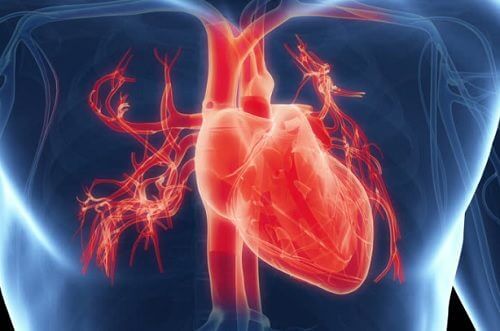5 Important Things You May Not Know about "Broken Heart Syndrome"


Written and verified by psychologist Valeria Sabater
It’s so much more than the poetic and symbolic meanings that we associate with the term “broken heart.” Broken heart syndrome is a real heart condition that we should know about.
It’s curious that this stress-related cardiomyopathy was only described recently for the first time.
In the 90’s, a Japanese doctor first published a scientific article about it. In it, he described a series of clinical characteristics that the rest of the medical community was not familiar with.
When this disease occurs, a light contraction of the left ventricle causes a choking sensation and excessively increases adrenaline.
A Curious Syndrome
These are the three basic characteristics that Takotsubo used to define the cardiomyopathy.
However, from then until now, this medical condition has become far more well known. With this knowledge have come aspects that have nuances and still need to be studied.
Among these is the fact that it’s a heart condition that resolves itself in a few days without causing any issues. In addition, it curiously only affects the female gender.
While there’s still so much science needs to discover about this disease, it’s important to know what triggers it and how to prevent it.
Today, we’ll take a look at some interesting facts about this syndrome.
1. Broken heart syndrome can be more serious among men
Broken heart syndrome is very common among women. Actually, many believe that it’s exclusive to this gender. In addition, many mistakenly think that this is the most common heart issue that one can suffer from.
However, we want to clear some things up:
- Broken heart syndrome appears especially in women who are going through menopause.
- However, Takotsubo cardiomyopathy can also affect men. It affects them less frequently, but it’s a fact that we can’t ignore.
Men present greater clinical history associated with heart issues than women. Because of this, the fact that this type of stress-related cardiomyopathy can appear at any moment could result in something very serious or deadly for a man who has prior cardiac issues.
Likewise, it’s worth pointing out that although it’s more normal in females, this does not mean that it’s a common medical issue or that doctors see it every day in their medical centers or emergency rooms.
In this case, we’re dealing with a type of temporary cardiac abnormality. In reality, it’s not as common as heart attacks.
2. There is no heart failure: it’s a temporary disorder

The most complicated thing about Takotsubo cardiomyopathy is that the person actually thinks s/he is suffering a fatal heart attack.
The symptoms are the same. However, once the doctors have finished their clinical tests, they realize instantly that it is not heart failure:
- There is no blood clot that’s blocking the arteries.
- Instead, it’s becoming something very alarming: the left ventricle has a conical form.
- This change is due to the impact of the adrenaline that is – temporarily- distorting the heart muscle, but not the coronary arteries themselves.
In general, this change resolves itself after time without any consequences.
However, it’s an issue if you have previous heart problems or if you suffer from it on more than one occasion.
We recommend:
3. Suddenly, our emotions attack our heart
A disappointment, a loss, a strong emotional impact, bad news…
Our mind is not prepared for adversity and, when it appears, our brain reacts to it poorly: releasing a combination of toxic hormones that directly attack the heart.
- The levels of dopamine, adrenaline, and noradrenaline increase an incredible amount. They are catecholamines that flow in our blood and directly impact the heart muscle.
- This is, effectively, similar to an internal blow that is followed by paralyzing chest pain, a choking sensation, and dizziness…
The person thinks s/he is going to die. Her or his emotions suddenly are the enemies, because it’s as though the person doesn’t know how to properly handle certain moments of life.
Also read:
The Release of Adrenaline: the Activation, Stress and Headache Hormone
4. Can I die from broken heart syndrome?
An idea that has become very popular is that no one can die from “having a broken heart.”
However, we need to clarify a few things:
- If you don’t control your stressful situations, something that starts as a simple cardiomyopathy can become a severe heart condition, like a heart attack.
- If you continuously suffer from this syndrome, the heart muscle can become damaged.
- Takotsubo cardiomyopathy can be very serious in older patients or in people that have other, associated illnesses.
So, you should look at this medical condition as a “warning.” Consider it a direct invitation to take care of yourself a little better, both physically and mentally.
5. No one is prepared for adversity or bad news, but we can “train ourselves”

We already know that no one can prevent what will happen tomorrow, and no one knows how to react to bad news.
The best thing to do is take care of your body and train your mind to make it stronger. Learn to remain calm on the inside, to be resilient, and to have self-control.
Here are some basic guidelines.
- Be careful with your daily habits. Avoid smoking, eat healthy foods, and exercise. All of this will provide you with a stronger heart.
- Train your emotions. To do this, you can practice different relaxation techniques, meditation, full attention…
- Find activities that free your emotions, that make you feel good, and that benefit your well-being: dancing, painting, writing, talking with friends, taking classes…
In conclusion, although broken heart syndrome may not be a serious or deadly medical condition, you should view it as a demonstration of how your emotions – when not properly managed – can cause you pain at any given moment.
All cited sources were thoroughly reviewed by our team to ensure their quality, reliability, currency, and validity. The bibliography of this article was considered reliable and of academic or scientific accuracy.
- Petritsch, B., Wendel, F., Leyh, R. G., & Frantz, S. (2011). The broken heart. Circulation. https://doi.org/10.1161/CIRCULATIONAHA.110.988121
- Mahajani, V., & Suratkal, V. (2016). Broken heart syndrome. Journal of Association of Physicians of India. https://doi.org/10.1016/j.jradnu.2016.04.002
- Virani, S. S., Khan, A. N., Mendoza, C. E., Ferreira, A. C., & de Marchena, E. (2007). Takotsubo cardiomyopathy, or broken-heart syndrome. Texas Heart Institute Journal. https://doi.org/10.1345/aph.1M568
- Sachdev, E., Noel Bairey Merz, C., & Mehta, P. K. (2015). Takotsubo cardiomyopathy. European Cardiology Review . https://doi.org/10.1007/s10741-013-9404-9
-
Rojas Jiménez, S, Lopera-Valle JS. Cardiomiopatía de Takotsubo, el gran imitador del infarto agudo del miocardio. Rev. CES Med 2012. 26 (1): 107-120. [Online] Avaiable at: http://www.scielo.org.co/pdf/cesm/v26n1/v26n1a10.pdf
This text is provided for informational purposes only and does not replace consultation with a professional. If in doubt, consult your specialist.








